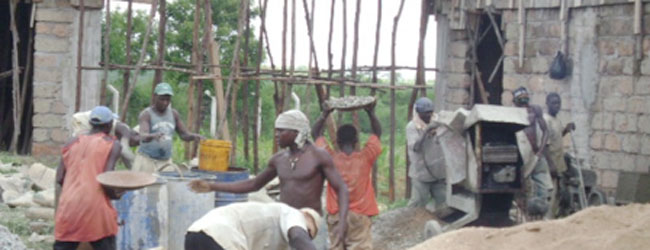I saw a moment of pure divinity Tuesday while watching “Anderson Cooper 360”: Haitians singing their hearts out in spite of the perils and the hopelessness surrounding them.
Days after the 7.0 magnitude earthquake, the beautiful people of Haiti came out in unison to show that although their country was broken, their souls remained resilient.
They marched through the rubble of their city, singing Christian songs in Creole of faith and hope. Even seasoned reporters like Anderson Cooper seemed astonished and caught off guard.
The poorest people in the Western hemisphere, who lost their loved ones, homes, clothes, money and more, were singing songs of hope and faith.
It was a bold declaration, one capable of making even Stone Cold Steve Austin cry.
As I watched, I couldn’t hold back the free-flowing tears — a very rare occurrence.
I remembered a time when I wore those shoes — a state of total loss and emotional pain.
To all who’ve lost a loved one to sudden death, you know just what I am talking about (Pardon me for going all personal on you today).
I lost my father to a heart attack about four years ago and it was an emotional earthquake of sorts. My family was distraught.
My mom was left to be the sole breadwinner at the age of 37.
She was jobless as she resigned from a managerial position at a stock investment firm weeks before my dad passed away. At that point, poverty became a real possibility for me.
And as the firstborn and only son, I had to be something more than just a little teenage boy.
Suddenly I had to grow up. I had to be strong for my young widowed mom and even stronger for my younger fatherless sisters.
Like the daddy’s boy I was, I was thrown under the rubble of pain, lost in a wreckage of disbelief, crushed by agony and swamped by endless nights of tears, just like the Haitians.
And like the Haitians, I used to sing hymnals and write poetry just to get away from depression’s paws.
I remember playing Horatio Spafford’s “It Is Well With My Soul” on the violin.
Each note spoke to me. The refrains were like strength to my soul, and the melody was like a whisper of hope.
Whenever the burdens of my newfound responsibilities weighed me down, I could count on the lyrics of the song to lift me up.
During this period of my deepest sorrow, I realized the poet in me. I wrote poems that painted my world anew — poems that kept my spirit in shape.
There is something magical about the art forms (music, poetry, etc.), that seems to relieve our sufferings, and that was what the people of Haiti reminded us of.
Now here is an interesting fact: According to World Health Organization statistics, people who live in some of the most impoverished regions of the world are less likely to have suicidal tendencies than those who live in richer regions.
You might wonder, why? It is complete logical reasoning to think that the poorer you are, the more likely you are going to find life meaningless and not worth living.
But as seen in Haiti, poor people, especially in the Caribbean, Latin America and Africa, know how to reach for the hope factor — the thought that when there is life, there is hope.
They know the safety and sense of belonging that fellowship and community provide.
Culturally, they are engineered to know how to combine the magic of the art forms, faith and religion in combating the quakes of life.
Now, when I look back at that perilous time in my life, I can attribute my every smile today to the strength and hope I got from my faith, hymns and poetry.
I don’t claim to have the best of lives, but looking back at the earthquake of my past, I can say I have come a long way.
It does pay to keep the hope alive, because a knockdown is never a knockout.
Food For Thought: You can destroy everything a woman owns but you cannot destroy her soul. Today might be marred, but tomorrow is unwritten. Why lose hope?



